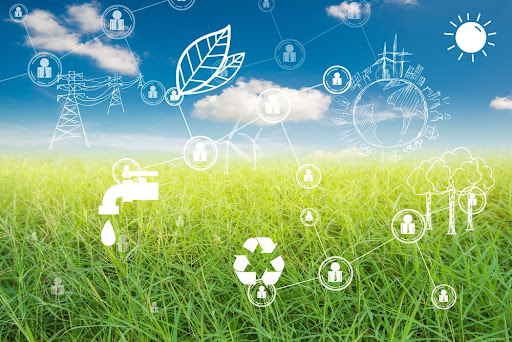The Role of Online Learning in Driving The Sustainable Development Goals (SDGs)
In the quest for global sustainability, online learning has emerged as a powerful force, empowering individuals with the knowledge and tools necessary to advance the Sustainable Development Goals (SDGs). The SDGs, a universal call to action to end poverty, protect the planet, and ensure that all people enjoy peace and prosperity by 2030, encompass a wide range of objectives, from environmental conservation to social equity and economic growth.
The role of education, particularly in the realms of Environmental, Social, and Governance (ESG) and sustainability, is critical in equipping both current and future generations with the understanding and capabilities required to meet these ambitious goals.
The advent of online learning platforms specializing in ESG, and sustainability topics has significantly transformed the landscape of educational access, democratising the ability to contribute to the SDGs on a global scale. These digital platforms have broken down traditional barriers to education, such as geographical limitations, financial constraints, and time restrictions, making it possible for anyone with internet access to gain insights into sustainable practices and principles.
This evolution in how we access and engage with educational content is proving to be an indispensable ally in the collective effort to achieve the SDGs by bringing forward a widespread and inclusive culture of sustainability literacy.

Bridging the Knowledge Gap
The Sustainable Development Goals (SDGs), which the United Nations announced in 2015, consist of 17 connected objectives intended to serve as a “blueprint to achieve a better and more sustainable future for all” by 2030. These goals address the global challenges we face, including poverty, inequality, climate change, environmental degradation, peace, and justice.
Each goal, with its specific targets, calls for a concerted effort from countries, businesses, and individuals alike to nurture a sustainable, safer, and more equitable world. The breadth and depth of the SDGs underscore the need for a comprehensive understanding of how various sectors and actions contribute to these broad goals.
To this end, online learning platforms appear to be powerful tools for spreading knowledge about the SDGs and sustainability. They offer ESG & sustainability courses that break down the complexities of each goal into manageable and understandable segments, tailored to diverse learning needs. This educational approach not only aids in spreading awareness but also equips individuals with the practical skills and knowledge necessary to contribute to the SDGs.
By leveraging the global reach and adaptability of online platforms, education on sustainability becomes more dynamic and accessible, allowing for the immediate application of learned principles in various professional and personal contexts.
Moreover, the structure of online learning eases a multidisciplinary understanding of sustainability, encouraging learners to see the connections between their actions and the broader goals. This well-rounded view is essential for inspiring innovative solutions that address multiple SDGs simultaneously. Furthermore, the interactive nature of many online platforms enhances the learning experience, allowing for the exchange of ideas and best practices among a global community of learners. This collective learning environment not only enriches individual understanding but also introduces a sense of global citizenship and shared responsibility for achieving the SDGs.
The Power of Scalability
The scalability of online learning platforms is particularly game-changing when tied directly to advancing the Sustainable Development Goals (SDGs). This feature not only broadens access to education but also accelerates the dissemination of critical sustainability knowledge across the globe. As the challenges addressed by the SDGs evolve—be it emerging climate data, shifting social norms, or innovative technological solutions—online platforms can swiftly adapt, updating and expanding course content to reflect the latest developments.
This ensures that learners are not only well-informed about the current state of sustainability efforts but are also equipped with the most relevant tools and strategies to contribute to the SDGs effectively. Through this dynamic and scalable approach to education, online learning becomes a powerful catalyst for the global achievement of the SDGs, enabling rapid dissemination of knowledge and growing a worldwide community of informed and active participants in sustainability efforts.
Customisation and Engagement
Online learning platforms possess the ability uniquely tailor the educational journey to everyone, moving beyond the conventional one-size-fits-all model to a more personalized approach. This customization allows learners to align course content with their own pace, areas of interest, and prior knowledge, creating a learning experience that is as unique as the individual themselves.
Such personalization not only bolsters learner engagement but also significantly enhances retention of information. It transforms learners from passive recipients into active participants in their education, ensuring they are not just absorbing information but engaging with it in a way that resonates with their personal learning journey.
Moreover, the use of interactive tools, forums, and the integration of real-world case studies into the curriculum enriches the learning experience further. These elements encourage students to apply theoretical knowledge to practical situations, bridging the gap between academic concepts and real-world applications. This active engagement is pivotal in translating sustainability principles into actionable strategies that can drive progress towards the Sustainable Development Goals (SDGs).
By offering such a dynamic and interactive learning environment, online platforms ensure that sustainability education is not only informative but also profoundly impactful, equipping learners with the necessary tools to contribute effectively to global sustainability efforts.
Collaboration and Innovation
Achieving the Sustainable Development Goals (SDGs) is by nature a collaborative effort, requiring partnerships that transcend geographical, sectoral, and disciplinary boundaries. Online learning environments excel at creating a virtual space where this type of widespread collaboration can flourish. These digital platforms facilitate the creation of a vibrant, global community that shares a commitment to sustainability and ESG principles by bringing together learners from all over the world.
This unique aspect of online learning not only allows for the exchange of a wide array of ideas and experiences but also lays the foundation for collaborative projects that address sustainability challenges. Through forums, group projects, and discussion boards, learners can pool their knowledge, challenge each other’s assumptions, and co-create innovative solutions that have the potential to make a real-world impact.
Additionally, the inherently interdisciplinary nature of sustainability is reflected in the structure of online courses, which often draw upon the expertise of professionals from a variety of fields. This multidisciplinary approach enriches the learning experience by offering a comprehensive view of sustainability that encompasses environmental, social, and economic dimensions. Exposure to such a diverse range of perspectives not only broadens learners’ understanding of sustainability but also cultivates critical thinking and creativity.
These skills are crucial for devising effective strategies to tackle the SDGs’ complex challenges. By encouraging learners to think outside the box and consider multiple viewpoints, online learning platforms are instrumental in nurturing the next generation of sustainability leaders, equipped to navigate and solve the multifaceted problems our world faces.
EcoSkills: Empowering Action Beyond Awareness
While raising awareness about sustainability and the SDGs is crucial, it is only the first step. The goal of education in this context is to empower individuals to take meaningful action. Online courses in ESG and sustainability are designed not only to inform but also to inspire learners to implement sustainable practices in their personal and professional lives. By equipping individuals with practical skills, such as how to conduct a carbon footprint analysis or develop a corporate social responsibility strategy, online learning ensures that knowledge translates into impact. This action-oriented approach is critical for moving the needle on the SDGs and turning theoretical understanding into real-world progress.
On this note, it is essential to recognize the role of platforms like EcoSkills in supporting the achievement of the SDGs. As a provider of specialized online courses in ESG and sustainability, EcoSkills is perfectly positioned to contribute to this global effort. By offering accessible, high-quality education tailored to the needs of today’s professionals, EcoSkills empowers individuals and organizations to integrate sustainability into their core operations, aligning with the SDGs’ overarching aim of creating a more sustainable and equitable world.
EcoSkills commitment to sparking sustainable development through education reflects a broader understanding of the critical role that knowledge and skills play in achieving the SDGs. As we continue to navigate the complexities of the 21st century, platforms like EcoSkills will be invaluable allies in the collective journey towards a sustainable future for all.
It can safely be stated as a fact that online learning, particularly in areas of ESG and sustainability, is a powerful tool in the global effort to achieve the Sustainable Development Goals. By making sustainability education accessible, engaging, and actionable, online courses are equipping individuals worldwide with the knowledge and skills needed to drive positive change. As we embrace the opportunities that the digital learning platforms present, we move closer to realizing the vision of a more sustainable and fairer world as envisioned by the 17 SDGs.



















